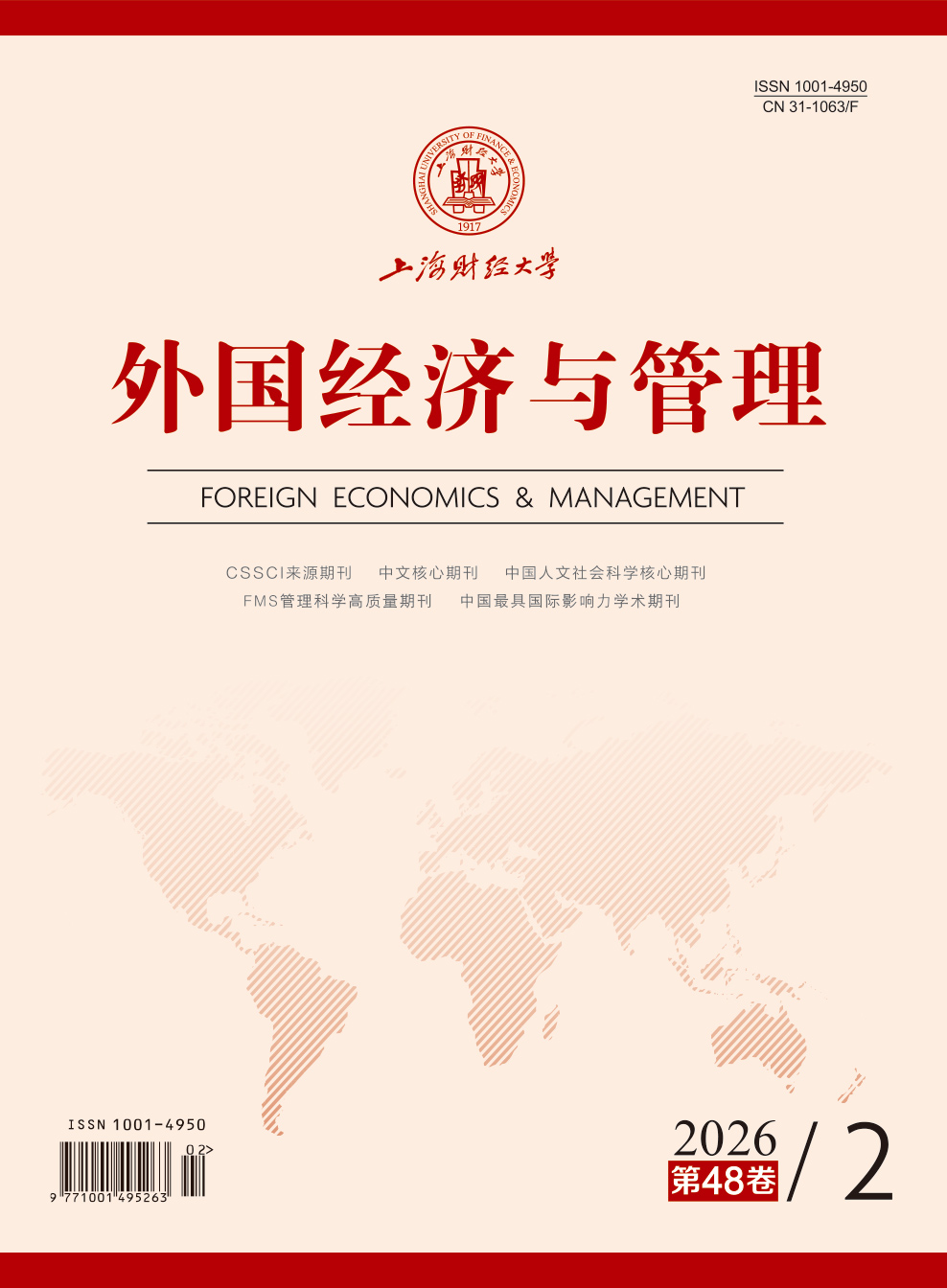高管权力研究的述评与基本框架构建
外国经济与管理 2014 年 第 36 卷第 07 期, 页码:3 - 13
摘要
参考文献
摘要
权力是决定资源配置效率和实际利益分配的一个重要因素,因此对权力问题的研究是经济和管理学者普遍关注的一个重要范畴。本文在阐述高管权力研究进展的基础上,从权力指标衡量的逻辑性和理论基础等角度分析了已有研究存在的不足;随后构建了一个高管权力研究的一般框架,并结合中国转轨经济的特殊情境,提出了厘清不同种类高管权力的关系、将系统性思维和本地化情境相结合等建议,为高管权力的进一步研究提供了参考和借鉴。
[1]Adams R B,et al.Powerful CEOs and their impact on corporate performance[J].The Review of Financial Studies,2005,1(4):1403-1432.
[2]Beatty R.P and Zajac E J.Managerial incentives,monitoring,and risk bearing:A study of executive compensation,ownership,and board structure in initial public offerings[J].Administrative Science Quarterly,1994,39(2):313-335.
[3]Boyd B K,et al.Dimensions of CEO-board relations[J].Journal of Management Studies,2011,48(8):1892-1923.
[4]Combs J G,et al.The moderating effect of CEO power on the board composition-Firm Performance Relationship[J].Journal of Management Studies,2007,44(8):1299-1323.
[5]Demsetz H and Lehn K.The structure of corporate ownership:Causes and consequences[J].Journal of Political Economy,1985,93(6):1155-1177.
[6]Eisenhardt K M.Agency theory:An assessment and review[J].The Academy of Management Review,1989,14(1):57-74.
[7]Fama E F.Agency problems and the theory of the firm[J].Journal of Political Economy,1980,88(2):288-307.
[8]Fan J P H,et al.Politically connected CEOs,corporate governance,and post-IPO performance of China’s newly partially privatized firms[J].Journal of Financial Economics,2007,84(2):330-357.
[9]Finkelstein S.Power in top management teams:Dimensions,measurement,and validation[J].The Academy of Management Journal,1992,35(3):505-538.
[10]French J R P and Raven B H.The bases of social power[A].Cartwright D.Studies in social power[C].Ann Arbor,MI:Institute for Social Research,1959:150-167.
[11]Galema R,et al.Do powerful CEOs determine microfinance performance?[J].Journal of Management Studies,2012,49(4):718-742.
[12]Hermalin B E and Weisbach M S.Endogenously chosen boards of directors and their monitoring of the CEO[J].The American Economic Review,1998,88(1):96-118.
[13]Jensen M C and Meckling W H.Theory of the firm:Managerial behavior,agency costs and ownership structure[J].Journal of Financial Economics,1976,3(4):305-360.
[14]Keltner D,et al.Power,approach,and inhibition[J].Psychological Review,2003,110:265-284.
[15]Lu L,et al.Twenty-five years of hidden profiles in group decision making:A meta-analysis[J].Personality&Social Psychology Review,2012,16(1):54-75.
[16]Mande V and Son M.CEO centrality and meeting or beating analysts’earnings forecasts[J].Journal of Business Finance&Accounting,2012.39(1-2):82-112.
[17]Mesmer-Magnus J R and DeChurch L A.Information sharing and team performance:A meta-analysis.[J],Journal of Applied Psychology,2009,94(2):535-546.
[18]Morse A,et al.Are incentive contracts rigged by powerful CEOs?[J].The Journal of Finance,2011,66(5):1779-1821.
[19]Ocasio W.Political dynamics and the circulation of power:CEO succession in U.S.industrial corporations,1960-1990[J].Admini-strative Science Quarterly,1994,39(2):285-312.
[20]Pathan S.Strong boards,CEO power and bank risk-taking[J].Journal of Banking&Finance,2009,33(7):1340-1350.
[21]Porta R L,et al.Corporate ownership around the world[J].The Journal of Finance,1999,54(2):471-517.
[22]Raven B H.The bases of power:Origins and recent developments[J],Journal of Social Issues,1993,49(4):227-251.
[23]Shleifer A and Vishy R W.A survey of corporate governance[J].The Journal of Finance,1997,52(2):737-783.
[24]Stasser G and Titus W.Pooling of unshared information in group decision making:Biased information sampling during discussion[J].Journal of Personality&Social Psychology,1985,48(6):1467-1478.
[25]Tosi H L,et al.Managerial discretion,compensation strategy and firm performance[A].Ferris G.Research in personnel and human resources management[C].Greenwich,CT:JAI Press,1999.
[26]Van Essen M,et al.Assessing managerial power theory:A meta-analytic approach to understanding the determinants of CEO compensation[J].Journal of Management,forthcoming.
[27]Wiseman R M and Gomez-Mejia L R.A behavioral agency model of managerial risk taking[J].The Academy of Management Review,1998,23(1):133-153.
[28]埃哈尔·费埃德伯格.权力与规则——组织行动的动力[M].上海:上海人民出版社,2005.
[29]方军雄.高管权力与企业薪酬变动的非对称性[J].经济研究,2011,(4):107-120.
[30]刘星等.高管权力与公司治理效率——基于国有上市公司高管变更的视角[J].管理工程学报,2012,(1):1-12.
[31]刘元春.权力与企业治理结构——一种马克思主义的动态宏观分析框架[J].教学与研究,2005,(3):12-19.
[32]卢锐等.管理层权力、在职消费与产权效率——来自中国上市公司的证据[J].南开管理评论,2008,(5):85-112.
[33]吕长江,赵宇恒.国有企业管理者激励效应研究——基于管理者权力的解释[J].管理世界,2008,(11):99-188.
[34]吕长江等.上市公司股权激励制度设计:是激励还是福利?[J].管理世界,2009,(9):133-188.
[35]王克敏,王志超.高管控制权、报酬与盈余管理——基于中国上市公司的实证研究[J].管理世界,2007,(7):111-119.
[36]权小锋,吴世农.CEO权力强度、信息披露质量与公司业绩的波动性——基于深交所上市公司的实证研究[J].南开管理评论,2010,(4):142-153.
[2]Beatty R.P and Zajac E J.Managerial incentives,monitoring,and risk bearing:A study of executive compensation,ownership,and board structure in initial public offerings[J].Administrative Science Quarterly,1994,39(2):313-335.
[3]Boyd B K,et al.Dimensions of CEO-board relations[J].Journal of Management Studies,2011,48(8):1892-1923.
[4]Combs J G,et al.The moderating effect of CEO power on the board composition-Firm Performance Relationship[J].Journal of Management Studies,2007,44(8):1299-1323.
[5]Demsetz H and Lehn K.The structure of corporate ownership:Causes and consequences[J].Journal of Political Economy,1985,93(6):1155-1177.
[6]Eisenhardt K M.Agency theory:An assessment and review[J].The Academy of Management Review,1989,14(1):57-74.
[7]Fama E F.Agency problems and the theory of the firm[J].Journal of Political Economy,1980,88(2):288-307.
[8]Fan J P H,et al.Politically connected CEOs,corporate governance,and post-IPO performance of China’s newly partially privatized firms[J].Journal of Financial Economics,2007,84(2):330-357.
[9]Finkelstein S.Power in top management teams:Dimensions,measurement,and validation[J].The Academy of Management Journal,1992,35(3):505-538.
[10]French J R P and Raven B H.The bases of social power[A].Cartwright D.Studies in social power[C].Ann Arbor,MI:Institute for Social Research,1959:150-167.
[11]Galema R,et al.Do powerful CEOs determine microfinance performance?[J].Journal of Management Studies,2012,49(4):718-742.
[12]Hermalin B E and Weisbach M S.Endogenously chosen boards of directors and their monitoring of the CEO[J].The American Economic Review,1998,88(1):96-118.
[13]Jensen M C and Meckling W H.Theory of the firm:Managerial behavior,agency costs and ownership structure[J].Journal of Financial Economics,1976,3(4):305-360.
[14]Keltner D,et al.Power,approach,and inhibition[J].Psychological Review,2003,110:265-284.
[15]Lu L,et al.Twenty-five years of hidden profiles in group decision making:A meta-analysis[J].Personality&Social Psychology Review,2012,16(1):54-75.
[16]Mande V and Son M.CEO centrality and meeting or beating analysts’earnings forecasts[J].Journal of Business Finance&Accounting,2012.39(1-2):82-112.
[17]Mesmer-Magnus J R and DeChurch L A.Information sharing and team performance:A meta-analysis.[J],Journal of Applied Psychology,2009,94(2):535-546.
[18]Morse A,et al.Are incentive contracts rigged by powerful CEOs?[J].The Journal of Finance,2011,66(5):1779-1821.
[19]Ocasio W.Political dynamics and the circulation of power:CEO succession in U.S.industrial corporations,1960-1990[J].Admini-strative Science Quarterly,1994,39(2):285-312.
[20]Pathan S.Strong boards,CEO power and bank risk-taking[J].Journal of Banking&Finance,2009,33(7):1340-1350.
[21]Porta R L,et al.Corporate ownership around the world[J].The Journal of Finance,1999,54(2):471-517.
[22]Raven B H.The bases of power:Origins and recent developments[J],Journal of Social Issues,1993,49(4):227-251.
[23]Shleifer A and Vishy R W.A survey of corporate governance[J].The Journal of Finance,1997,52(2):737-783.
[24]Stasser G and Titus W.Pooling of unshared information in group decision making:Biased information sampling during discussion[J].Journal of Personality&Social Psychology,1985,48(6):1467-1478.
[25]Tosi H L,et al.Managerial discretion,compensation strategy and firm performance[A].Ferris G.Research in personnel and human resources management[C].Greenwich,CT:JAI Press,1999.
[26]Van Essen M,et al.Assessing managerial power theory:A meta-analytic approach to understanding the determinants of CEO compensation[J].Journal of Management,forthcoming.
[27]Wiseman R M and Gomez-Mejia L R.A behavioral agency model of managerial risk taking[J].The Academy of Management Review,1998,23(1):133-153.
[28]埃哈尔·费埃德伯格.权力与规则——组织行动的动力[M].上海:上海人民出版社,2005.
[29]方军雄.高管权力与企业薪酬变动的非对称性[J].经济研究,2011,(4):107-120.
[30]刘星等.高管权力与公司治理效率——基于国有上市公司高管变更的视角[J].管理工程学报,2012,(1):1-12.
[31]刘元春.权力与企业治理结构——一种马克思主义的动态宏观分析框架[J].教学与研究,2005,(3):12-19.
[32]卢锐等.管理层权力、在职消费与产权效率——来自中国上市公司的证据[J].南开管理评论,2008,(5):85-112.
[33]吕长江,赵宇恒.国有企业管理者激励效应研究——基于管理者权力的解释[J].管理世界,2008,(11):99-188.
[34]吕长江等.上市公司股权激励制度设计:是激励还是福利?[J].管理世界,2009,(9):133-188.
[35]王克敏,王志超.高管控制权、报酬与盈余管理——基于中国上市公司的实证研究[J].管理世界,2007,(7):111-119.
[36]权小锋,吴世农.CEO权力强度、信息披露质量与公司业绩的波动性——基于深交所上市公司的实证研究[J].南开管理评论,2010,(4):142-153.
引用本文
李胜楠, 牛建波. 高管权力研究的述评与基本框架构建[J]. 外国经济与管理, 2014, 36(7): 3–13.
导出参考文献,格式为:
上一篇:TPP对中国的挑战及中国的选择





 7437
7437  297
297

